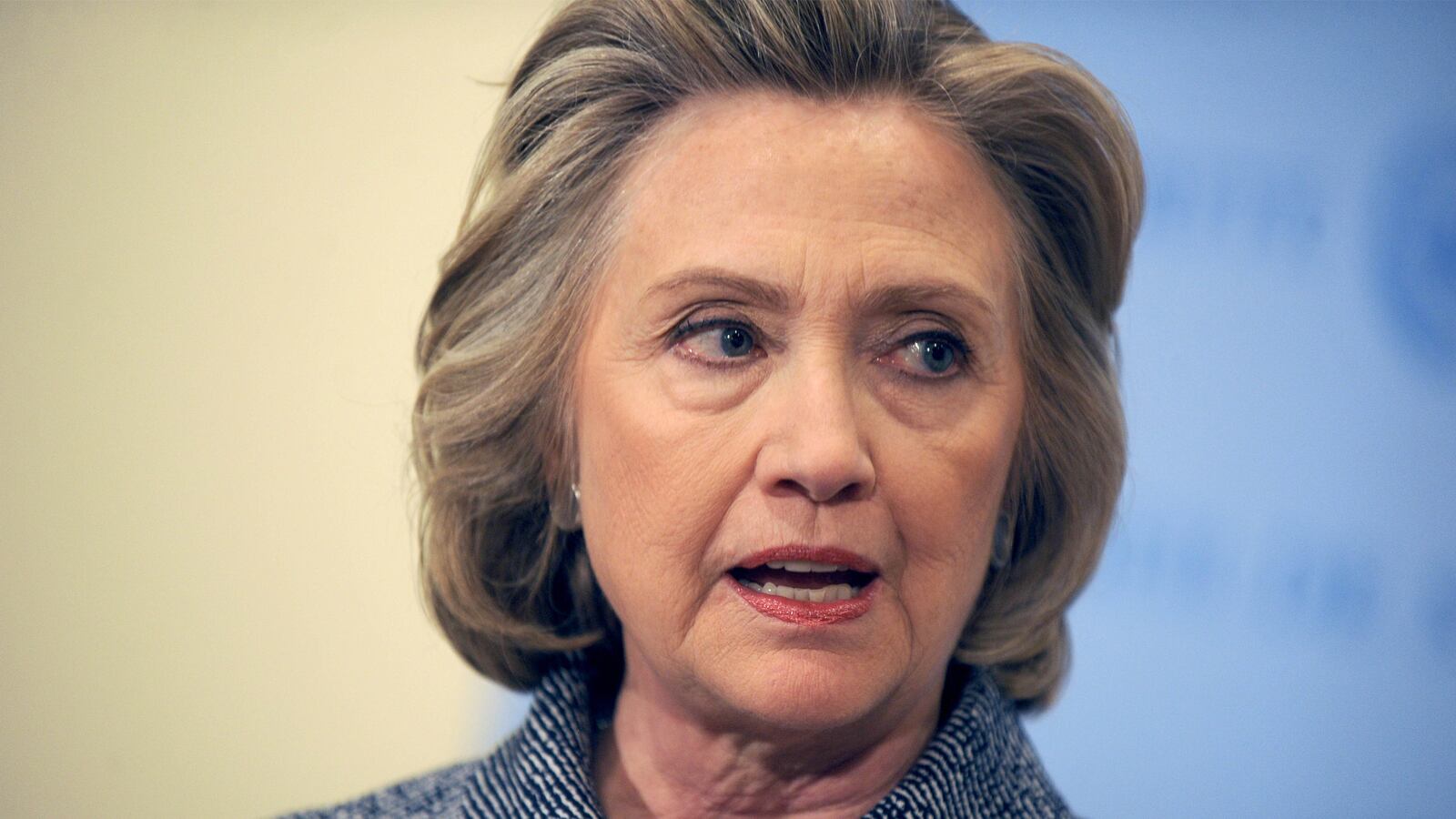It’s not often that Fox News admits its existence in an alternate reality, so I plan to treasure for all time the eureka moment that came as Gretchen Carlson vamped between B-roll shots of Hillary Clinton and the United Nations’ empty podium.
Searching for a way to frame the former secretary of state’s challenge at the upcoming press conference, Carlson made the obvious connection: “I don’t know if you watch House of Cards,” she suggested to her hapless guest, “but this year, President Frank Underwood in the first few episodes, I won’t ruin it for people, he talks a lot about transparency...Could Hillary Clinton take a really big step forward if she just came forward today and acted more like Frank Underwood and was totally transparent?”
One needs only the loosest grasp of the plotline to Netflix’s D.C.-set melodrama to appreciate that Carlson’s question was nuts. If we’re going to start asking our politicians to be more like their fictional counterparts, why not the guy from Independence Day? He is both fictional and a white man, which I assume are the qualifications Fox News wants the most in a Democrat. But if you’ve actually watched House of Cards, the comparison’s lunacy only deepens. (Spoiler alert!) For the comparison to make any sense at all, you have to be either totally ignorant of Underwood’s alternately kinky, megalomaniac, and homicidal urges, or suspect that Clinton also might be capable of Secret Service threesomes and/or pushing a reporter in front of a train.
Buried in Carlson’s twitchy hypothetical is an even deeper reliance on fiction. It speaks to a belief in the mythical framework that supports not just House of Cards but most supposedly reality-based punditry, as well: an ingrained assumption that politicians are not just rational actors but inhumanly rational ones, creatures of pure logic and naked ambition whose motives can only be understood within the context of a power grab or financial gain.
These D.C. comic book schemers make every decision with an eye on the long ball. They have no personal/interior life apart from craven careerism; every interaction, every dalliance, every tweet is part of the Master Plan. All scandals, in this logic, are about checkmate in three-dimensional chess rather than a careless error in tic-tac-toe.
Most politicians live through scandals to the degree that they can convince voters that their mistakes were not a part of House of Cards-scale schemes. It’s the job of opposition media to look for genuine corruption or malice; allies, on the other hand, insist on bewildered shrugs or populist appeals to universal fallibility.
Bill Clinton knew the value of not looking like he was playing three-dimensional chess. Hillary’s problem is that she never wants to look like she’s playing tic-tac-toe.
Here’s the thing: Her appeal is based in part on an assumption of supreme competence on her part: It makes sense of both her Tracy Flick-ish arrogance and her capacity for self-preservation. It’s why people think she would make a good president but also why they believe she would make an explicit “deal” with Bill to stay married—a thing that happens on soap operas but is emotionally impossible unless you’re a real psychopath. People think of Clinton conspiracy theorists and Clinton loyalists as being in opposite camps when to this extent they are really flip sides of the same steely, calculating coin.
Her protestations that her private email was the same kind of quotidian detritus you and I might send—social plans, white/gold dress jokes, and Paleo brownie recipes—ring hollow because of the ruthless and/or dedicated (depending on your party ID) demeanor she works hard to maintain.
We can’t quite believe Hillary has a private life in the way you and I do. Because she doesn’t want us to think she does.
Take her weirdly sterile accounting of what passes for apparently significant chunks of 30,000 “private, personal” emails: “E-mails about planning Chelsea’s wedding or my mother’s funeral arrangements, condolence notes to friends as well as yoga routines, family vacations, the other things you typically find in inboxes.”
I’ve been through both a wedding and a funeral recently enough that those details alone could generate a few thousand notes’ worth of an e-trail. Vacations? Also logistically complex! But how many condolences could she possibly have sent? And “yoga routines”? Perhaps that was tacked on to humanize her—yoga is very popular!—but instead it throws up a mental roadblock, because WTF, emailing “yoga routines”?
Hillary Clinton does yoga? Hillary Clinton does enough yoga that emails about it make up a memorable portion of 30,000 emails? Instead of coming across as normal, something Joe and Jane Kitchen Table can identify with, it reads as a blurry focus-group memory, perhaps something an aide added to the mix in the scramble to put a statement together. “We need something besides ‘condolences’! Something that says, ‘I also do things not related to death!’”
It is much easier to imagine, for all the wrong reasons, Bill Clinton sending around multiple emails about “yoga routines.” That Bill doesn’t actually use email is, on the whole, probably something the Hillary not-campaign should be thankful for—even if it does raise even more questions about the content of her non-wedding, non-funeral, non-travel, non-yoga correspondence.
Personally, I take her at her word that she probably carried only one device, and used only one email, because it was easier. But it couldn’t have escaped anyone in her circle’s attention that such a setup also would make sifting out “personal” material from the dragnet of mandated recordkeeping easier.
Nonetheless, I can’t quite push it to the third dimension of chess because any really masterful, intentional plan for diverting super-secret, incriminating emails would a) have enlisted more competent security advisers (or a security adviser, period); and b) not hinged on using the domain “clintonemail.com,” which seems like an improbably stupid place to keep super-secret, incriminating email. (Was her password “password,” too?)
Yet I suspect that the reason this scandal won’t hurt her is that I’m in the minority. She’s the rare politician to benefit from the assumption of Underwoodian skills. She’ll survive it not because people believe she made a human mistake but because they think she’s not quite human, not quite real. She’s all but fictional. The alternative is that she’s capable of the same dumb mistakes as the rest of us, and that’s as hard for her to admit as it is for us to believe.





